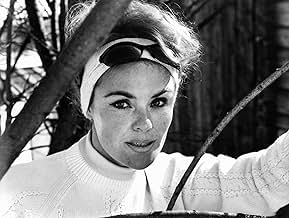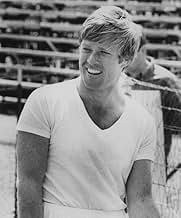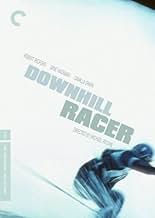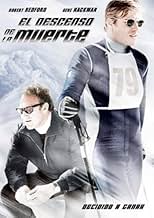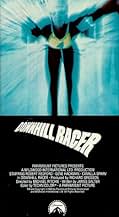VALUTAZIONE IMDb
6,3/10
5659
LA TUA VALUTAZIONE
L'arrogante David Chappellet entra a far parte del team di scii degli Stati Uniti e si scontra da subito con l'allenatore della squadra, Eugene Claire.L'arrogante David Chappellet entra a far parte del team di scii degli Stati Uniti e si scontra da subito con l'allenatore della squadra, Eugene Claire.L'arrogante David Chappellet entra a far parte del team di scii degli Stati Uniti e si scontra da subito con l'allenatore della squadra, Eugene Claire.
- Ha vinto 1 BAFTA Award
- 1 vittoria e 5 candidature totali
Recensioni in evidenza
Redford gives a low-key performance as a thoroughly unlikable member of the US Ski Team in the late 1960's, and he doesn't become any more likable as the story unfolds. Perhaps that's why the film gets such mixed reviews. The Olympic and racing sequences have an almost-documentary look to them, and for good reason. The story goes that IOC officials refused permission for the film crew to shoot during the actual Olympic events; the producers got around that inconvenience by giving hand-held cameras to cast members so they could shoot crowd scenes and background footage on the sly. It's hard to like David Chappellet, and making him a more sympathetic character might have been easier, but I think it's a much better story as-is. As we know all too well these days, world-class athletes aren't always aren't always the charming heroes we'd like them to be.
Downhill Racer is about Olympic skiing, but it's also about American society, and about how sport gives the illusion of being an escape from the loneliness of being undereducated.
Dave Chappellet (Robert Redford) grew up in the isolation of rural Colorado, where the career option after high school is working on a ranch or going to Denver to take a hairdressing course. His talent on skis has earned him a call to the US national ski team as a replacement after one of the members fractures his leg in a European race. When he arrives in Germany after what seems to have been his first airplane flight, he meets his new roommate, a Dartmouth graduate, one of several team members from that same Eastern undergraduate world.
Chappellet remains cautious and defensive as he tries to navigate the manners, attitudes, and values of the team and of the European civilization he encounters. He's made even more prickly by the code of team play which he's required to accept from his demanding coach, Eugene Clair (Gene Hackman). Clair believes that good sportsmanship and team solidarity are the basis for success in international skiing, and that's important because success is what will achieve financial support for the team from American business. But Chappellet refuses to play the sportsmanship game - partly because he knows he can't speak the Ivy League language his teammates have mastered, and partly because he knows that winning is the only way he'll stay on the team, and Clair's concept of sportsmanship won't help him win, any more than would the attitude or values of Chappellet's embittered father back in Colorado. Dave Chappellet know he's going to have to ski his own race, always.
Downhill Racer features a variety of exciting ski races filmed and edited with great skill, and they reveal very powerfully that, in the midst of all the thousands of spectators, each skier is alone on the mountain, and that winning comes from a combination of relentless focus and arbitrary fortune. With this truth presented so clearly and compellingly, Chappellet's refusal to play his coach's game is validated. On race day he has to ski faster than anyone else. No one else can help him. And neither will membership in the right club (or school, or social background). He has to do it on his own.
But being on your own is very lonely. Chappellet begins to want to belong, and chases after a kind of club membership in Europe, pursuing the very attractively worldly Carole Stahl (Camilla Sparv), executive assistant to a German ski manufacturer. He catches her because he's becoming famous, and thus useful, but discovers that he's not important to her. He's a pleasant diversion, but he can be discarded as easily as a pair of gloves. He receives praise from his coach, but only after winning races. Until he wins, he's the target of Clair's angry lectures about not thinking of the good of the team. Hackman's strangled speech and look of frustrated disgust as he berates the uncooperative Redford for having taken an unacceptable risk after practice create a high-water mark in American film acting, as does the surly self-centredness of Redford's response.
At the end of the movie, narrowly dodging defeat in the most important race in his career, Chappellet is hoisted on the crowd's shoulders in a frozen moment of apparent triumph. But only one value exists - winning. And his win is already history. There's no love in it, no acceptance more profound than his coach's praise, the crowd's shouts of excitement. And tomorrow's winner is already eyeing him in an unspoken challenge. Dave Chappellet is going to be skiing down this mountain alone for the rest of his life.
Looking back across nearly forty years to watch this excellent film, we can already begin to hear the question asked by Robert Redford's character in The Candidate, "What happens next?" The answer may be bleak - more competition, more loneliness - but the film helps us discover the answer in a fascinating way, because it puts us on those skis, rushing at impossible speed down the mountain, in a cocoon of our own heartbeats, our own laboured breathing. We're forced to ask ourselves, "Would we make the team? Would we win? And if we did, would it mean anything?"
Dave Chappellet (Robert Redford) grew up in the isolation of rural Colorado, where the career option after high school is working on a ranch or going to Denver to take a hairdressing course. His talent on skis has earned him a call to the US national ski team as a replacement after one of the members fractures his leg in a European race. When he arrives in Germany after what seems to have been his first airplane flight, he meets his new roommate, a Dartmouth graduate, one of several team members from that same Eastern undergraduate world.
Chappellet remains cautious and defensive as he tries to navigate the manners, attitudes, and values of the team and of the European civilization he encounters. He's made even more prickly by the code of team play which he's required to accept from his demanding coach, Eugene Clair (Gene Hackman). Clair believes that good sportsmanship and team solidarity are the basis for success in international skiing, and that's important because success is what will achieve financial support for the team from American business. But Chappellet refuses to play the sportsmanship game - partly because he knows he can't speak the Ivy League language his teammates have mastered, and partly because he knows that winning is the only way he'll stay on the team, and Clair's concept of sportsmanship won't help him win, any more than would the attitude or values of Chappellet's embittered father back in Colorado. Dave Chappellet know he's going to have to ski his own race, always.
Downhill Racer features a variety of exciting ski races filmed and edited with great skill, and they reveal very powerfully that, in the midst of all the thousands of spectators, each skier is alone on the mountain, and that winning comes from a combination of relentless focus and arbitrary fortune. With this truth presented so clearly and compellingly, Chappellet's refusal to play his coach's game is validated. On race day he has to ski faster than anyone else. No one else can help him. And neither will membership in the right club (or school, or social background). He has to do it on his own.
But being on your own is very lonely. Chappellet begins to want to belong, and chases after a kind of club membership in Europe, pursuing the very attractively worldly Carole Stahl (Camilla Sparv), executive assistant to a German ski manufacturer. He catches her because he's becoming famous, and thus useful, but discovers that he's not important to her. He's a pleasant diversion, but he can be discarded as easily as a pair of gloves. He receives praise from his coach, but only after winning races. Until he wins, he's the target of Clair's angry lectures about not thinking of the good of the team. Hackman's strangled speech and look of frustrated disgust as he berates the uncooperative Redford for having taken an unacceptable risk after practice create a high-water mark in American film acting, as does the surly self-centredness of Redford's response.
At the end of the movie, narrowly dodging defeat in the most important race in his career, Chappellet is hoisted on the crowd's shoulders in a frozen moment of apparent triumph. But only one value exists - winning. And his win is already history. There's no love in it, no acceptance more profound than his coach's praise, the crowd's shouts of excitement. And tomorrow's winner is already eyeing him in an unspoken challenge. Dave Chappellet is going to be skiing down this mountain alone for the rest of his life.
Looking back across nearly forty years to watch this excellent film, we can already begin to hear the question asked by Robert Redford's character in The Candidate, "What happens next?" The answer may be bleak - more competition, more loneliness - but the film helps us discover the answer in a fascinating way, because it puts us on those skis, rushing at impossible speed down the mountain, in a cocoon of our own heartbeats, our own laboured breathing. We're forced to ask ourselves, "Would we make the team? Would we win? And if we did, would it mean anything?"
The appeal of a ski film to those who ski is obvious. But imagine yourself innocent of skiing. Can it hold the attention of the rest of us? Roone Arledge and his "Wide World of Sports" provided one answer, as Jean Claude Killy and his successors skied into American living rooms on many winter Saturdays. "Downhill Racer" seconds the motion.
The late Mike Ritchie, who'd essayed nothing more ambitious than commercials, traveled the World Cup circuit in the 1967-68 winter, accompanied by Aspen novelist Jim Salter, whose screenplay (from Oakley Hall's very different novel) effectively was written in segments the night before each shoot. Almost everything about this production was improvised.
Athletes are not necessarily interesting people. Killy was; stories about him, some even true, are legion. David Chappellet (a young Robert Redford), more typically, reminds one of the astronauts in "2001", with their limited range of expressions and nothing particularly interesting to say. This comes across powerfully in several hilarious interview scenes, with American and European journalists trying in vain to get the young man to say something worth writing down.
Wengen, Switzerland passes for several World Cup race sites. (A Swiss medico wears an armband identifying him as "Arzt", or doctor, at a supposed French venue). The filmmakers also were present in Grenoble for the Winter Olympics, providing a fictional inside look at the Games far different from that of, for example, "Chariots of Fire".
One still doesn't ski, but the pleasures of "Downhill Racer" are undeniable.
The late Mike Ritchie, who'd essayed nothing more ambitious than commercials, traveled the World Cup circuit in the 1967-68 winter, accompanied by Aspen novelist Jim Salter, whose screenplay (from Oakley Hall's very different novel) effectively was written in segments the night before each shoot. Almost everything about this production was improvised.
Athletes are not necessarily interesting people. Killy was; stories about him, some even true, are legion. David Chappellet (a young Robert Redford), more typically, reminds one of the astronauts in "2001", with their limited range of expressions and nothing particularly interesting to say. This comes across powerfully in several hilarious interview scenes, with American and European journalists trying in vain to get the young man to say something worth writing down.
Wengen, Switzerland passes for several World Cup race sites. (A Swiss medico wears an armband identifying him as "Arzt", or doctor, at a supposed French venue). The filmmakers also were present in Grenoble for the Winter Olympics, providing a fictional inside look at the Games far different from that of, for example, "Chariots of Fire".
One still doesn't ski, but the pleasures of "Downhill Racer" are undeniable.
There were some curious choices made when this movie was put together. There seems no reason why the film couldn't have been much more successful if it had wanted to be. It has some fine actors, the skiing is great and the plot is basically the same as "Top Gun".
Robert Redford is one of the most charming and charismatic leading men of the modern era, but here he plays an unlikeable loner. In fact, almost everyone in the film is more likable than Redford, and you really wish someone would beat some sense into him. So we don't really care that much if he wins or loses.
The film isn't helped much by the jazz score, which would work for some noir detective flick, but hardly for the high adrenaline sport of downhill racing. Pity.
Robert Redford is one of the most charming and charismatic leading men of the modern era, but here he plays an unlikeable loner. In fact, almost everyone in the film is more likable than Redford, and you really wish someone would beat some sense into him. So we don't really care that much if he wins or loses.
The film isn't helped much by the jazz score, which would work for some noir detective flick, but hardly for the high adrenaline sport of downhill racing. Pity.
After many years of catching brief scenes of this now semi-cult film, I finally watched it in its entirety. It is not a great film, but for film students, and fans of both Gene Hackman and Robert Redford, it's a must. The opening credits are delivered over scenes of a Super G skier flying down the mountain and feature a combination of stop action and over-cranked footage. The film quality is beautiful, and although the techniques now seem dated, they stand for what was cutting-edge editing at the time. Watching the opening, you feel like you're in for a great ride but are sadly let down by a staid script. Having said that, the film can sort of get a way with this (at least to a certain extent) because you've got such great actors playing the main roles of skier (Redford) and coach (Hackman). Both know how to exploit the economy of language and show a lot simply with body language and expression. (They must have realized they had to with this script.) Add to that fact, that the character Redford is playing - a vainglorious Super G racer named David Chappellett, probably wouldn't have much to say.
Ultimately, the film serves as cinematic commentary on how fleeting success is in a sport like skiing, as well as the shallowness shown by both the press that cover the sport, and the women that covet the skiers.
Ultimately, the film serves as cinematic commentary on how fleeting success is in a sport like skiing, as well as the shallowness shown by both the press that cover the sport, and the women that covet the skiers.
Lo sapevi?
- QuizTen days before filming began, star Robert Redford accidentally drove a snowmobile over a cliff, tearing his tendon and requiring seven stitches in his knee.
- BlooperTires don't squeal on snow, yet Dave manages this when driving the Porsche.
- ConnessioniFeatured in Siskel & Ebert & the Movies: Robert Redford (1992)
I più visti
Accedi per valutare e creare un elenco di titoli salvati per ottenere consigli personalizzati
- How long is Downhill Racer?Powered by Alexa
Dettagli
- Data di uscita
- Paese di origine
- Lingue
- Celebre anche come
- Cuesta abajo
- Luoghi delle riprese
- Sankt Anton am Arlberg, Austria(Arlberg-Kandahar World Cup race)
- Aziende produttrici
- Vedi altri crediti dell’azienda su IMDbPro
Botteghino
- Budget
- 1.600.000 USD (previsto)
Contribuisci a questa pagina
Suggerisci una modifica o aggiungi i contenuti mancanti

Divario superiore
By what name was Gli spericolati (1969) officially released in India in English?
Rispondi

